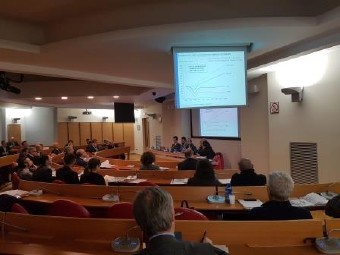ChemMultimodal launched Pilot Projects
The project partners organised the kick-off pilot workshops with the companies to initiate pilot activities by introducing the functioning and use of the tools. In many cases, the discussions during the workshop were used to agree on further bilateral or small meetings to further explore multimodal transport potentials.
Kick-off Workshop Poland
The Polish partners from Warsaw School of Economics (SGH) and Polish Chamber of Chemical Industry (PIPC) started their pilot phase on 29th of September 2017. The kick-workshop was dedicated to a brief overview of the ChemMultimodal project and an introduction of the functioning and use of the toolbox supporting the reconfiguration of transport processes to the 13 participants provided by Marzenna Cichosz. This first session was completed by an interesting discussion with participants focused on the toolbox advantages and disadvantages and the need of its continuous development. After this, a presentation on the possibility of using multimodal transport by transport service providers was held by Aleksandra Kocemba, multimodal transport manager of Raben Group. This presentation resulted in a discussion on advantages and disadvantages of the multimodal transport as well as the potential of modal shift in the chemical industry. The third part of the workshop focused on good practice examples, developed by Synthos S.A. in light of the project idea and supply chain strategy of this company provided by Maciej Susik. In addition the workshop was used to collect additional information from the participating companies based on a questionnaire. The workshop ended with a discussion about the pilot project and its implementation, in which the participants had the opportunity to give feedback. Most of the participants could be successfully attracted to cooperate with the polish project team.
Kick-off Workshop Slovakia
Project partners from Slovakia staged its pilot phase kick-off workshop on 19 September 2017 in the premises of the Association of Chemical and Pharmaceutical Industry of the Slovak Republic (ZCHFP SR) in Bratislava. The project team were invited to present the project including its toolbox and to discuss potentialsfor more multimodal transport. Among the 14 participants logistic specialists of chemical companies, specialists for chemical transport and operators of multimodal transport and terminals participated in the workshop with focus on the situation in transport of chemical industry and the potential of modal shift from road transport. Participants were welcomed by the secretary general of ZCHFP Mrs. Surova and got informed about the activities of the union, the activities of the working commissions, the legislative activity and the participation in the projects. The current activities of the working committee for logistics and DINS as well as the activities and achieved results of the ChemMultimodal project were announced by the chairman of the working commission Mr. Cermak. Participants also got to know about the procedures within the project. The procedure in the pilot project for SCHP CR was discussed by Mr. Zivec. Moreover, the deputy Minister of Transport Mr. Marušinec spoke about the activities of the ministry. In addition, the company LKW Walter, a major operator in the transport of semitrailers, spoke about experience with trailer transport in Europe. Furthermore, discussions about challenges in road transports (such as the persistent lack of drivers) and the expectations of multimodal developmen took place.
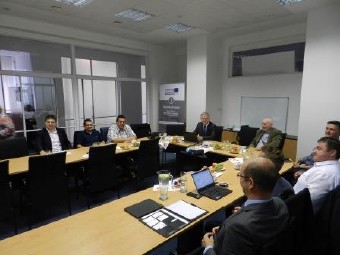
After discussions, the participants were invited to visit the SPaP Terminal in Bratislava which has a direct connection to the railway network, road network (motorway access) and internal pipelines from the refinery Slovnaft.
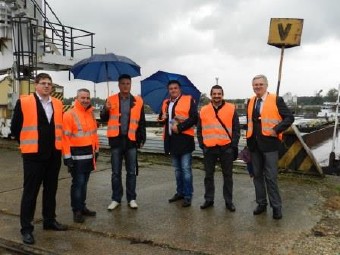
Kick-off Workshop Saxony-Anhalt
Saxony-Anhalt's pilot kick-off workshop took place on 2 November 2017 in Sckopau. More than 50 participants including chemical companies, logistics service providers, terminal operators and regional as well as national public authorities participated in the event. The aim of this workshop was to exchange experience on multimodal transport of chemical goods as well as on opportunities and challenges of multimodal transport. In the center of the workshop was a discussion on potentials for more multimodal transport and a presentation of the developed toolbox. Before terminal operators and logistics service providers presented their capacities, Peter Lüttjohann as representative of the Federal Ministry for Transport and Digital Infrastructure spoke about the measures of the national government to promote combined transport, including funding to improve rail access for companies and to increase terminal capacities. On one hand, presentations of Central German terminals (Schkopau, Schwarzheide, Leipzig-Wahren) showed that handling capacities nearly doubled in recent years, leading to new direct train connections within and beyond Central Europe. On the other one, train operators (Lineas, Mitteldeutsche Eisenbahn, Hupac) and logistics service providers (Bertschi) called for closer cooperation to realise intermodal potentials, i.e. adding multimodal modules to block trains running between well connected terminals, and investments to improve rail infrastructure bottlenecks. In addition, more transparency and open IT systems could help to identify cooperation potentials. The existing IT platform Intermodal links as an important part of the ChemMultimodal toolbox was presented. In the next weeks, bilateral consultation with chemical companies will follow to investigate multimodal potentials. A similar workshop will reunite the participants early in 2018.
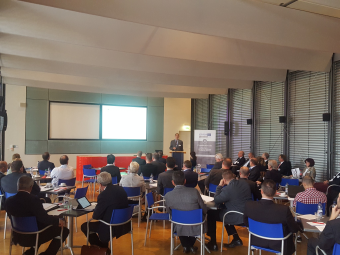
Kick-off Workshop in Upper Austria
About 15 actors participated in the kick-off workshop in Austria which took place on 7 November 2017 in the TechCenter in Linz. The workshop had the title “Multimodale Transporte in Europa”, which focused on the development of intermodal infrastructure, respective capacities of multimodal transport shift and current challenges in transportation. Moreover, best practice examples were introduced. After that, the Austrian partners presented the ChemMultimodal toolbox and explained the use of the elements and their different function in order to handle multimodal transports. Last part of this event was dedicated to a discussion about presented topic and pilot activities moderated by Ursula Kopp DI, MBA, MSc, FHOÖ – Logistikum Steyr. Here, the challenge of an existing mismatch between demand and supply of multimodal transport (Logistics Service Provider vs. chemical company) was tackled.
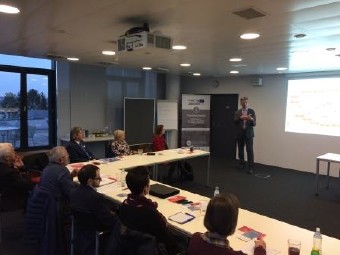
Kick-off workshop in Novara
The Italian partners started their pilot project on 4 of December 2017 in Milan focusing on multimodal transport as a chance for future developments of chemical transports. In particular, this pilot workshop addressed the question: how can the project help companies to improve multimodal transports? In order to analyze this crucial question, the workshop was divided in two parts. Firstly, the state of the art of chemical logistics and the development of multimodal transport and its prospects in Italy were presented. Then the Italian project partners introduced the elements of the ChemMultimodal toolbox and demonstrated how they could support the decision-making process and potentially boost multimodal transport. The following part of the workshop was devoted to the actual multimodal transport actors, who exposed the situation from their perspective and articulated ideas how multimodality can be improved. Particularly, this session comprised problems and obstacles of the multimodal transport and the questions: Do Chemical Companies really care about multimodality? How terminals can promote multimodality to overcome the difficulties of traditional rail transport?
